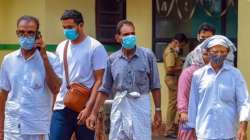No Nipah virus scare, four infected patients in Kerala's Kozhikode recover, test 'double negative'
Nipah virus is a highly contagious and deadly zoonotic virus, and any suspected case is treated with utmost care and vigilance to prevent its spread within the community.

Nipah virus scare: Kerala Health Minister Veena George on Friday said that four people, including a nine-year-old boy, who were under treatment for Nipah in Kozhikode district of the state have recovered.
In a statement, the Health Minister shared the good news and said, "Four people including a nine-year-old boy, who were under treatment in Kozhikode for Nipah virus, have recovered and tested double negative (two samples tested in intervals)."
Two died from virus
A total of six people in the district were infected with the virus, of which two died. The initial fatality, which occurred on August 30, is identified as the index case or patient zero, from whom others subsequently caught the infection.
Earlier, the Kerala government had lifted containment measures and associated restrictions in the northern district since no new cases of Nipah virus had been reported there since September 16. However, the district authorities urged people to continue their vigil against the virus infection, maintain social distancing and ensure the use of masks and sanitizer.
Since the Nipah virus outbreak was declared in the state on September 12, all institutions in the district had been closed since September 14, and online classes were being conducted.
'Mortality rate of Nipah virus higher than Covid-19'
Indian Council of Medical Research, Director General Rajeev Bahl said that the Nipah virus' cases mortality rate is higher in comparison to Covid cases. The Nipah virus mortality rate is 40-70 per cent as the Covid virus' is 2-3 per cent. He also stressed how efforts are being made to contain the virus. He said, "We do not know why the cases keep surfacing. In 2018, we found the outbreak in Kerala was related to bats. We are not sure how the infection passed from bats to humans. The link could not be established. Again we are trying to find out this time. It always happens in the rainy season".
What is Nipah virus?
The Nipah virus is a zoonotic infection that transmits between species, from animals to humans or vice versa. The Nipah virus is caused by fruit bats and is potentially fatal to humans as well as animals. It was first identified in 1999 during an outbreak of illness among pig farmers and others in close contact with the animals in Malaysia and Singapore. It can also be transmitted through contaminated food or directly between people. The virus was isolated and identified in 1999 and is named after a village in Malaysia, Sungai Nipah.
Signs and symptoms
The symptoms of the virus are similar to COVID-19, which include sore throat, dizziness, drowsiness, muscle pain, tiredness, headache, stiff neck, sensitivity to light, confusion and blank, seizures, and encephalitis.
In humans, the Nipah virus has various infections ranging from asymptomatic infection to acute respiratory infection (mild, severe), and fatal encephalitis.
Initial symptoms include fever, headaches, myalgia (muscle pain), vomiting and sore throat. This can be followed by dizziness, drowsiness, altered consciousness, and neurological signs that indicate acute encephalitis. Some people can also experience severe respiratory problems.
According to the guidelines of the WHO, the patients infected with the virus can experience pneumonia and severe cases might see encephalitis and seizures which may lead to come within 24 to 48 hours. The incubation period for this virus can range between 5-14 days and go on up to 45 days.
(With agencies input)
Also Read: Nipah Virus's mortality is higher compared to Covid infection, says ICMR
Also Read: West Bengal: Suspected Nipah virus case admitted in Kolkata hospital after Kerala visit